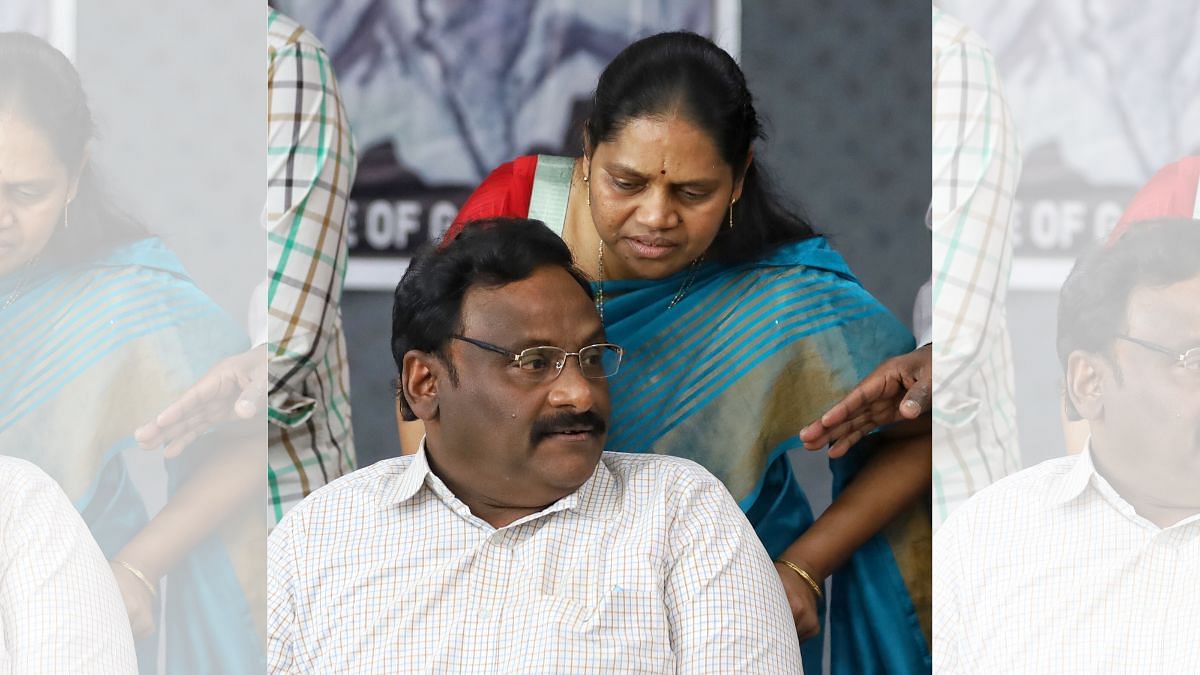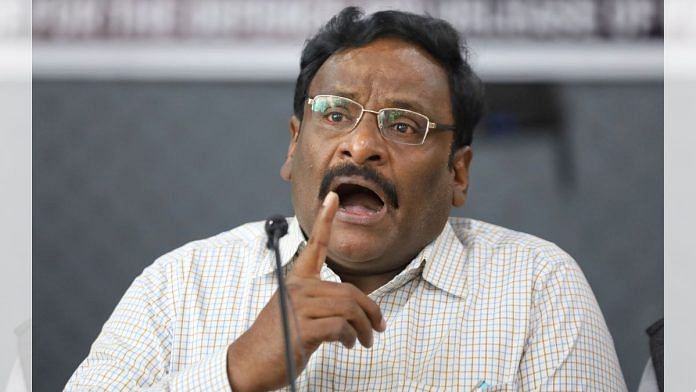New Delhi: “I have passed agni pariksha (trial by fire) not once but twice,” said G.N. Saibaba.
The former Delhi University (DU) professor was speaking to the media Friday for the first time since his acquittal by the Bombay High Court in a Maoist links case.
“I was called a terrorist. My family was stigmatised. I was not even allowed to see my mother at the time of her death,” he said.
Speaking at the press conference held at Delhi’s HKS Surjeet Bhawan, an emotional Saibaba recounted his time behind bars, speaking about the conditions in the prison, the health issues he allegedly developed since his arrest in 2014, and the cramped cell in Nagpur Central Jail where he was kept after his conviction in 2017.
Saibaba was first arrested in May 2014 by Maharashtra Police on charges of being a member of the banned outfit Communist Party of India (Maoist), of providing them with logistical support and helping in recruitment. He was granted interim bail in 2016, but then convicted and sentenced to life in March 2017. In October 2022, another bench of the HC had acquitted Saibaba and others, but the judgment was stayed by the Supreme Court the same year. On 23 April, 2023, the apex court set aside the judgment and asked the chief justice of the Bombay HC to list the appeal filed by Saibaba before a new bench.
Nearly 10 years after his initial arrest, Bombay HC Tuesday acquitted him and five others again in the case citing several lapses in investigation, such as non-compliance with provisions of the Unlawful Activities (Prevention) Act, 1967, and discrepancies in date of arrest in police documents, among other things.
“Today, I am not able to understand where I am…because I feel like I’m still inside my prison cell. I am not able to come to terms with the reality in front of me even 24 hours after my release. I am not able to adjust to the surroundings because I have only looked at closed walls for seven years (since 2017),” Saibaba said.
“Perhaps the entire world knew that the case was fabricated even 10 years ago, but there was no relief. Not even after the higher judiciary acquitted me. It was like the agni pariksha Sita faced. And we had to go through it twice,” he added.
Also read: Class 10 student of Delhi’s Army Public School dies by suicide, no suicide note found
‘My lawyer targeted’
Saibaba spoke about his family’s trials during his incarceration.
“They were stigmatised. My family could sustain themselves because of your support,” he said, addressing a dozen or so reporters at the press conference.
“It perhaps has become the biggest political case in the country where the prosecution has done all it can to suppress me in all kinds of illegal and immoral ways. It was a long struggle for lawyers,” he said.
He alleged that activist-lawyer Surendra Gadling — who represented Saibaba during the trial in the case and who is currently incarcerated in the Elgar Parishad case — was unfairly targeted because of his arguments in the trial court. He added that Gadling, who is facing severe health issues in Taloja Prison, is not receiving the necessary medical attention. Just like Saibaba’s health concerns were allegedly deliberately neglected.
“During the trial, certain police officers appeared before my lawyer and threatened him saying, ‘After Saibaba, we’ll take care of you’. He is now facing the same consequences as I did. He has developed a heart condition and sometimes falls unconscious inside his prison cell. Even life-saving drugs are being denied to Gadling,” Sai Baba alleged, adding that Gadling has filed a case against Taloja Prison authorities under section 307 (attempt to murder) of the Indian Penal Code (IPC).
“I don’t know how I survived,” said Saibaba. “Maybe only with the hope that one day I could come back and work with my friends and comrades.”
‘Pandu Narote died in front of my eyes’
Sai Baba recounted the death of Pandu Narote, a co-accused in the case. Narote passed away in 2022, reportedly due to Swine Flu at the age of 33. According to Saibaba, Narote had little understanding of the law or the judgment and said that the two had never met prior to being imprisoned together in Nagpur Central Jail.
“The first question he asked me was what was the meaning of the judgment and what would happen to us. He did not know the law and its processes. He belonged to the most primitive tribe. He had never stepped out of his village in Gadchiroli,” he said.
Saibaba claimed that Narote succumbed to “simple fever”, which was later termed as swine flu. “He died in front of my eyes,” he said. “He wasn’t taken to the hospital till he started bleeding profusely from his eyes and blood was found in his urine. Till the last minute, there was no mention of swine flu. No tests were done. It’s perplexing how, with modern medicine available, such a death could occur.”
Also read: CBI raids home of ex-IAS officer behind Make in India, Startup India in disproportionate assets case
‘Almost every organ in my body failing me’
Speaking about his health condition, Saibaba said that at the time he went to jail, the only affliction he had was polio, which he has had since childhood. “But now, my each and every organ is failing me,” he said.
He alleged that the police had dragged him by his left shoulder while he was in custody, leading to damage to five muscles responsible for the functioning of his left shoulder and his nervous system. He said that he was given no treatment for nine months and by the time he was taken to the hospital, doctors said it was too late to revive his nervous system.
He prepared for surgery after securing interim bail in 2016, but was sent back to prison in 2017 after his conviction.
“I still face shooting pains from my left arm to my left leg. Doctors were also not called for the paralysis attack I suffered.”
He listed the other health issues he is currently facing.
“I don’t know how I acquired HCM (hypertrophic cardiomyopathy). The left side of my heart is only functioning at 55 percent capacity. Doctors have said that if it falls by even a few percentage points, I won’t survive,” he said, adding that he also suffers from acute pancreatitis and has gallbladder stones.
“Because I could not eat due to lack of accessibility, my gallbladder developed stones and shrank. Subsequently, I developed acute pancreatitis. Later on, one MRI suggested that there was a cyst in my brain. Doctors prescribed heart monitoring four years ago and a sleep apnea test, saying that I had developed obstructive sleep apnea seven years ago. Till today, neither test has been conducted.”
He further alleged that he was denied medicines sent by his wife Vasantha until he sat on a hunger strike. “And even then, it was given after a delay of 10-15 days,” he said.

“The jail is filled with SCs, STs, OBCs, and minorities. They never get any treatment. Perhaps they consider me the biggest terrorist in the world and that’s why I did not get treatment.”
‘Denied parole to see my dying mother’
Towards the end of his almost 40-minute address, Sai Baba reached his emotional peak as he talked about being denied parole at the time of his mother’s death.
“My mother passed away on 1 August, 2020. With me being disabled since childhood, my mother — who was illiterate and grew up in a village — raised me with great care. When she died, I was not allowed to see her. Before her death, I was denied parole to see her. After her death, I was denied permission to attend her funeral. After the funeral, I was denied parole to attend post-funeral activities by the prison authorities, governments and courts,” he said.
According to Saibaba, it was his conviction and incarceration that led to his mother’s death and said that she had just one wish towards the end of her life — to see him — and she was denied that wish.
“Which criminal is denied even this right?” he asked. “The state is there to serve the people, not crush humanity…. The state is formed by people to stop disorder and anarchy, but the state itself has become anarchy. Now, it is crushing humanity brutally.”
(Edited by Zinnia Ray Chaudhuri)
Also read: How CBI extradited Narender Singh, murder convict in 30-year-old case, from UAE




Misplaced sympathy, that is what this article is. This man in a wheel chair instantly evokes sympathy because of his disability even eliciting comments like “yeh kisika kya kar sakta hai”. But one question that begs an answer is Why should any government keep behind bars an invalid for ten years, unless it had clinching evidence that this urban Naxal was an antinational, who wanted to wreck the existing system of governance and cause chaos and disorder in the country, which is the doctrine of all Naxalites?. Any way, only time will tell if his release was for the good of the society or otherwise.